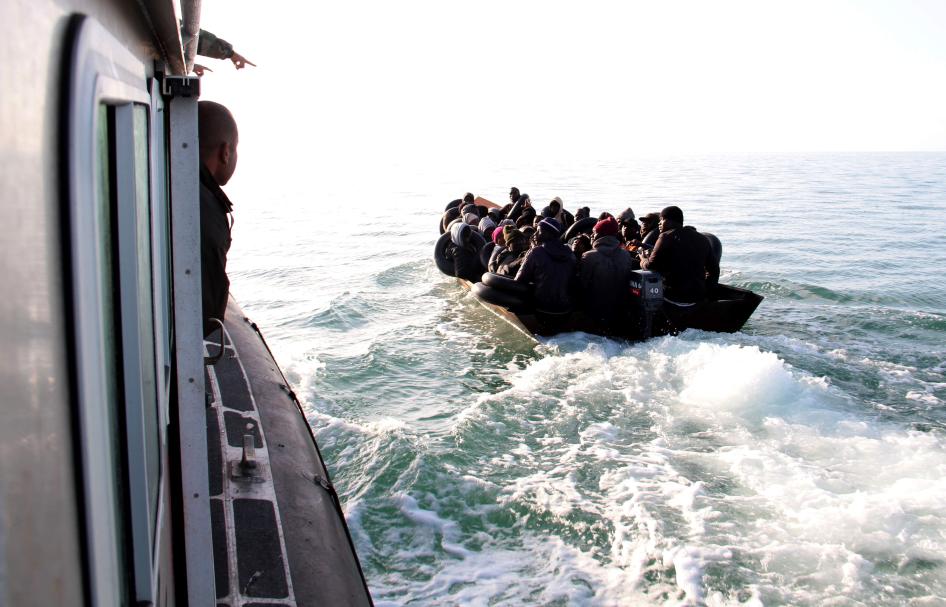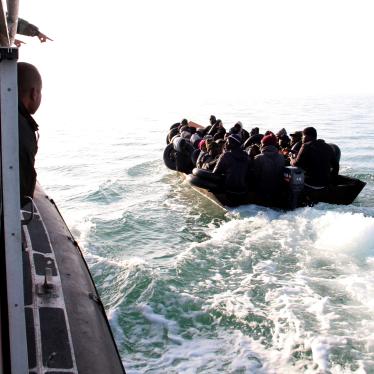In view of the rampant human rights violations against migrants, asylum seekers, and refugees in Tunisia, especially those who are Black; Tunisia’s lack of an asylum system; the Tunisian government’s crackdown on civil society, judicial independence, and the media; and the impossibility of fairly and individually determining nationalities or assessing the protection needs of migrants and asylum seekers while at sea, it is clear that Tunisia is not a safe place for the disembarkation of people intercepted or rescued at sea. The ongoing cooperation between the European Union (EU), EU member states, and Tunisia on migration control which includes reliance on the possibility to disembark people rescued or intercepted at sea in Tunisia – similar to previous cooperation with Libya – is contributing to human rights violations.
European policies to externalize border management to Tunisia are supporting security authorities who are committing serious violations. They are also obstructing people’s rights to leave any country and to seek asylum, containing refugees and migrants in countries where their human rights are at risk. Moreover, disembarkation in Tunisia can endanger individuals and expose them to serious harm, and further puts refugees and migrants at high risk of collective expulsion to Libya and Algeria, which can violate the principle of non-refoulement. The establishment on 19 June 2024 of the Tunisian Search and Rescue Region (SRR), called for and supported by the European Commission, risks becoming another tool to violate people’s rights rather than a legitimate fulfillment of the responsibility to protect safety at sea. Mirroring its cooperation with Libya, the EU and its member states’ engagement with Tunisia may have the effect of normalizing serious violations against people seeking protection and undermining the integrity of the international search and rescue system by twisting it to serve migration control purposes.
As humanitarian and human rights organizations, we call on the EU and its member states to terminate their cooperation on migration control with Tunisian authorities responsible for serious human rights violations at sea and in Tunisia. Search and rescue NGOs and commercial ships should not be instructed to disembark anyone in Tunisia.
Widespread and Repeated Violations of Human Rights
Findings from Tunisian and international organizations, as well as UN bodies, over the past two years indicate that Tunisia cannot be considered a ‘Place of Safety’ for people intercepted or rescued at sea, most notably Black people as defined by the 1979 SAR Convention, the Maritime Safety Committee (MSC) and UN bodies.
Despite being party to the 1951 UN Refugee Convention, Tunisia has no national asylum law or system. People who enter, stay in, or exit the country irregularly are criminalized by law. Following interceptions at sea or after arbitrary arrests on Tunisian territory, Tunisian authorities have repeatedly abandoned refugees, asylum seekers, and migrants in the Tunisian desert or remote border regions with Libya and Algeria. These practices can amount to unlawful collective expulsions, demonstrate a total disregard for refugees’ and migrants’ right to life, and may violate the principle of non-refoulement. People expelled face the risk of serious human rights violations in Libya and onward expulsions from Algeria to Niger. According to reports citing information from the UN, Tunisian security forces have notably rounded up people presumed to be irregular migrants on land and directly transferred them to Libyan authorities, who subsequently subjected them to arbitrary detention, forced labor, extortion, torture and other ill-treatment, and unlawful killings.
According to the accounts of refugees, migrants and asylum seekers documented by Amnesty International, Human Rights Watch, OMCT, and Alarm Phone, Tunisian authorities at sea have committed abuses and put lives at risk during boat interceptions – including by high-speed maneuvers threatening to capsize the boats, physical violence, firing tear gas at close range, and colliding with the boats – followed by a failure to systematically ensure individualized assessments of protection needs at disembarkation. Tunisian authorities have also subjected refugees, asylum seekers and migrants to torture and other ill-treatment in the contexts of disembarkations, detention, or collective expulsions.
At the same time, several international and local organizations, human rights defenders and lawyers have reported an alarming deterioration of civil liberties and fundamental rights in Tunisia, impacting both the migrant population and Tunisian citizens.. Since 2021, the country has witnessed a significant rollback of human rights, characterized by a dismantling of institutional safeguards for their protection, an erosion of judicial independence and a clampdown on freedom of expression, association and peaceful assembly. The disembarkation in Tunisia of Tunisian nationals intercepted or rescued at sea, which could include people fleeing persecution, torture or other serious harm and intending to seek asylum abroad, could effectively deny the right to seek asylum to those in need of international protection.
The European Union’s Complicity in Human Rights Abuses
Despite the documented human rights violations by Tunisian authorities, the EU and its member states have stepped up their support for Kais Saïed’s administration. Through the Memorandum of Understanding signed in July 2023, the EU promised Tunisia 1 billion Euros, including 105 million Euros dedicated to border and migration management, effectively in exchange for preventing sea departures towards Europe, which includes people in need of protection. With the implementation of a Tunisian Search and Rescue Region (SRR), the Tunisian government has met a long-standing priority set by the EU. While on the one hand this represents a formal step towards the fulfillment of Tunisia’s responsibility to protect life at sea, the reality is that European Rescue Coordination Centers (RCC) will now refer boats in distress within the Tunisian SRR to the Tunisian RCC, reinforcing a gradual disengagement of EU actors in favor of actors with a poor human rights record.
By supporting an increased role for the Tunisian Coast Guard (National Guard) – without any human rights benchmarks or monitoring system in place, nor arrangements to ensure that rescued people are disembarked in a place of safety which cannot be Tunisia – the EU is contributing to a risk of further serious human rights violations at sea and in Tunisia against refugees and migrants and people at risk of persecution in the country.
Humanitarian space for search and rescue (SAR) NGOs will also be further curtailed, if European RCCs instruct SAR NGOs to liaise with the newly established Tunisian MRCC for disembarkation, which they may refuse to respect the principle of non-refoulement. The UN refugee agency, UNHCR, has noted that vessels at sea are not the appropriate place for determining protection needs. Under international maritime law, states have the primary responsibility for coordinating rescues within their SRRs and for arranging disembarkation in a place of safety, which may be another state.
European Support of Human Rights Violations Must End
These developments follow the pattern witnessed in Libya since 2016. In addition to material, technical and political support, the EU and Italy supported the establishment of a Libyan SRR and MRCC, thus leading to a transfer of SAR responsibility to the Libyan Coast Guard and increased pullbacks and disembarkations in Libya, all while being aware that this would expose refugees and migrants to a serious risk of horrific and deadly violations in Libya. Both the Italian government and EU institutions have not only continued this cooperation, but sought to extend it to other countries, including in Tunisia.
We therefore urge the EU and its member states to:
- Call on Tunisian authorities to end human rights violations against refugees, asylum seekers, and migrants, including urgently with regards to life-threatening and unlawful collective expulsions.
- Call on Tunisian authorities to end the crackdown on civil society.
- Ensure that SAR NGOs and commercial ships are not instructed to disembark people they rescue at sea in Tunisia, given the risks of human rights violations there, and given that fair individual assessments concerning these risks cannot be made at sea. Tunisia cannot be considered a place of safety for people rescued at sea under applicable international law.
- Terminate financial and technical support to Tunisian authorities responsible for serious human rights violations in relation to border and migration control.
Signatories
- Afrique-Europe Interact
- Alarme Phone Sahara (APS)
- All Included Amsterdam
- Amnesty International
- Associazione per gli Studi Giuridici sull'Immigrazione (ASGI)
- Association CALAM
- Association for Justice, Equality and Peace
- Association Lina Ben Mhenni
- Association Marocaine d'aide des Migrants en Situation Vulnérable (AMSV)
- Association pour la promotion du droit à la différence (ADD)
- Association Sentiers-Massarib
- Association tunisienne de défense des libertés individuelles
- Aswat Nissa
- Avocats Sans Frontières (ASF)
- BAOBAB EXPERIENCE
- Campagna LasciateCIEntrare - MaipiuCIE
- Carovane Migranti
- CCFD-Terre Solidaire
- Chkoun? Collective
- Comité de Sauvegarde de la LADDH
- Comité pour le respect des libertés et des droits de l’Homme en Tunisie (CRLDHT)
- CompassCollective
- Damj - l'Association Tunisienne pour la justice et l'égalité
- Dance Beyond Borders
- EMERGENCY
- Fédération des Tunisiens pour une Citoyenneté des deux Rives (FTCR)
- Fédération Internationale pour les Droits Humains (FIDH)
- Forum Tunsien pour les Droits Economiques et Sociaux (FTDES)
- FUNDACION SOLIDAIRE
- Human Rights Watch
- Intersection pour les droits et les libertés
- iuventa-crew
- L'association Tunisienne pour les Droits et les Libertés (ADL)
- La Cimade
- LDH (Ligue des droits de l'Homme)
- Maldusa
- Médecins Sans Frontières
- MEDITERRANEA Saving Humans
- Melting Pot Europa
- migration-control.info project
- Migreurop
- Missing Voices (REER)
- Mission Lifeline International e.V.
- PRO ASYL Bundesweite Arbeitsgemeinschaft für Flüchtlinge e.V.
- r42-SailAndRescue
- Reclaim the Sea
- Refugees in Libya - APS
- Refugees Platform In Egypt (RPE) منصة اللاجئين في مصر
- Resqship
- SALVAMENTO MARITIMO HUMANITARIO -SMH
- SARAH Seenotrettung gUG
- Sea-Eye e.V.
- Sea-Watch e.V.
- Search and Rescue Malta Network
- Seebrücke
- SOS Humanity e.V.
- SOS MEDITERRANEE
- Statewatch
- Union des diplômés-chômeurs (UDC)
- United4Rescue - Gemeinsam retten e.V.
- Univ. of Southern California Gould School of Law Immigration Clinic
- Watch the med Alarm Phone








